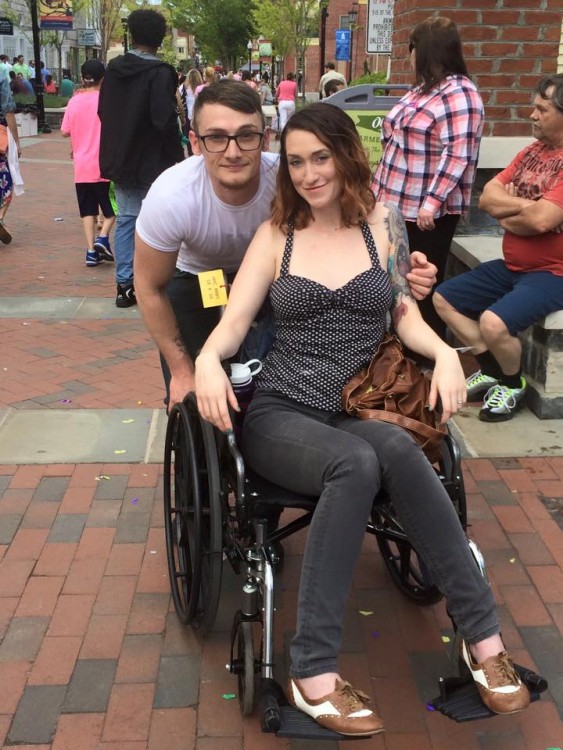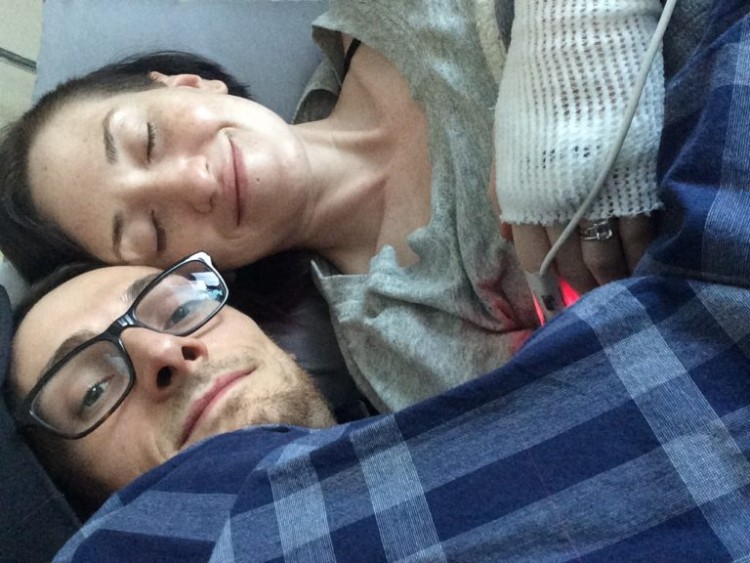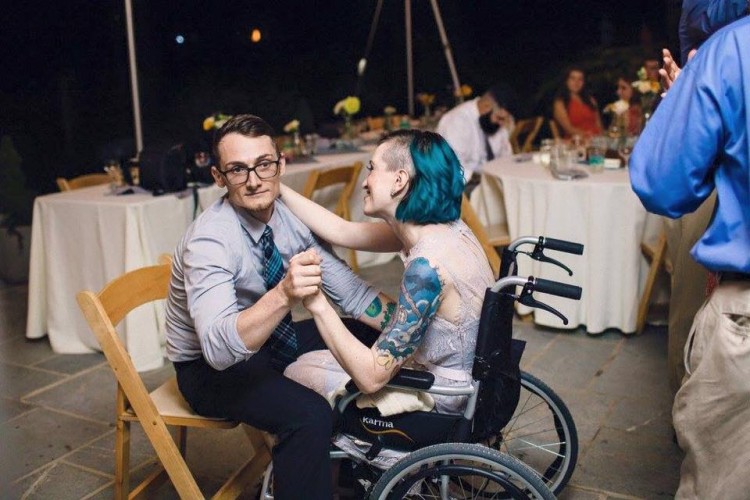They say you fall in love when you least expect it.
I have always found this to be true. I have been in love as an adult three times in my life and each time was unexpected. I wasn’t looking, just doing my usual weirdo bookworm introvert thing and… then bam! The entire experience of someone I didn’t “see” coming and sweeping me off my feet was always tremendous and life-changing.
I suppose you could say the same for chronic illness and pain. It blindsides you much like love but only leaves chaos in its wake, like a bad break-up that never ends. It’s a heartbreaking thing and will affect everything, including and especially your primary relationship: your significant other.
Being chronically ill can change everything in your life, but one thing that usually gets hit the most is your relationships, specifically the one with your romantic partner (if you have one). No matter long you were together “before” and the roles you each inhabited within the relationship, those roles change. The changing is hard, frustrating, and painful for both of you. Before I got sick, I was the breadwinner and did most of the cleaning in the house. I could pick up groceries after work and feed the dogs in the morning while my husband Sean still slept. I was equal partner in our relationship, someone who could pull their own weight.
It all changed when I got sick.

So what in the world do you do as a couple to navigate these huge losses and deal with the ups and downs of chronic illness?
Well, here are some tips from us that may help you.
1. Be honest and communicate.
I know I know this is kind of important advice for all couples, but I want to especially focus on it discussing chronic illness and relationships. I have found it’s best to keep talking, keep telling each other what’s going on even when it’s uncomfortable or scary. It’s so easy to get cut off from one another and that will over time create a split in your relationship. I used to keep things from Sean because I thought I was “doing him a favor” by not telling him how bad stuff was, he let me know repeatedly that he wanted to be fully a part of my life and that “protecting him” just put distance between us.
2. Accept that there will be resentments on both ends.
I had a spectacular home nurse last year who I became close enough to that we would talk sometimes the entire few hours that I got my weekly IVIG infusion. One day we talked about how Sean was doing with everything and Charles (Charles, I miss you!) told me I needed to give Sean room to be angry and resentful. It was fantastic advice. It’s hard to watch the person you love become sick and it sucks to have so much more riding on your shoulders.
You miss your partner and you can sometimes feel resentful of all the changes that happen even though you cognitively understand it isn’t your partner’s fault. The person who is sick may also feel resentful. It’s hard to not be jealous of your partner’s ability to go do what they want and it’s lonely to be sick alone at home because your partner is out trying to conquer the world because you can’t. Talk about it and don’t take the resentment personally if you can. I like that Sean can tell me sometimes he’s angry or resentful and it doesn’t hurt my feelings because I know he needs to be able to say it without me getting mad.
3. Make time together.
Being sick can zap the romance out of your relationship real quick. Gone are the days of date nights and going out sporadically. That doesn’t mean you can’t spend time together, it just means you have to be a little more creative. Set aside a night at least every other week where you are together — no phones, no computers for a few hours. Watch a movie and get some take out or make a quick easy meal you both enjoy. Be with each other. Do a picnic in bed or a picnic outside if your body can tolerate it. Play board games or do a puzzle together. Put on your favorite song and slow dance or just hold hands while sitting side by side. Read a book and take turns reading out loud to one another.
Just make sure to be with each other in shape or form once a week or at least a few times a month.
4. Intimacy may look different than before
I’m going to be real frank here so listen up. Your sex life may suffer when you are chronically ill and pain. You may be too tired to do it or you may be in too much pain. Lots of medications like opiates and SSRIs can do a real number on your sex drive. Some people have chronic pain in their private parts which makes sex sometimes almost impossible.
I know for myself being touched anywhere is sometimes too uncomfortable, I have nerve damage in my groin, and my ongoing nausea is a real mood killer, too. It’s upsetting, embarrassing, and frustrating. I used to beat myself up about this constantly and get stuck in an inner dialogue of what a terrible unsexy partner I was. Please don’t do that.
One thing that I have learned through this experience is stop viewing sex through a heteronormative lens. Sex doesn’t always equal putting part A in part B… sex and intimacy can happen in all kinds of variations and ways. Stop beating yourself up over what you used to be able to do sexually and focus on what you can. Intimacy is intimacy, and chances are your partner will be grateful for whatever you can do, so just be intimate with another in whatever form you can. If they aren’t appreciative or complain a lot or make you feel guilty… ditch their ass to the curb. These links have some helpful tips (here and here) and www.chronicsex.org is fantastic.
5. Don’t talk about your illnesses 24/7.
I know it’s hard when your body dominates your brain 24/7, but let’s face it. Talking about illnesses, pain, and medical stuff gets boring… fast. I know I get really sick of talking about it. I know Sean does, too. Sometimes he will just say “OK I need to change the subject” and sometimes I just do my best to spend the day without bringing up my body. You both know what’s going on and you both need a break. You are not just a sick person and your partner is not just a caretaker.
Chronic illness can complicate things but you are still you, the couple you were at the beginning but wiser and more wary.
6. Understand that one of you doesn’t have it worse than the other.
I once read a post on Reddit’s popular “subforum” Relationships. It was from a man whose wife was chronically ill but seemed to have given up on life and expected her husband to not have a life outside the house. I commented about my/our experience and then saw a comment from someone who was also chronically ill. One thing that immediately stood out to me was “She has it worse than you.” That comment bothered me a great deal.
I think it’s dangerous to think that you ever have it worse than someone else and I think it’s also not good to think you have it worse than your spouse. Yes I understand that I deal with things Sean doesn’t — 24/7 chronic pain, chronic nausea almost as bad as my pain, being disabled. That being said, Sean deals with things I don’t. He mourns the woman he met and fell in love with, he deals with powerlessness as he watches me writhe in pain. He often has way more responsibility because I can’t contribute.
You both are dealing with tough situations, and being competitive about who has it worse is toxic to your relationship.
7. Have outside support.
Social support when going through hard situations is so imperative. I have found that it’s especially important with chronic pain. You both need to people to lean on as you navigate this hard journey together. Just relying on each other isn’t enough. You each need friends and family members to talk to, to go out and do things with, and someone who will give you advice when you need it. Your partner may sometimes feel emotionally tapped out so you need others to help out when you are feeling blue or frustrated with the situation at hand.
8. Be clear in what you need from one another.
Some days I just want Sean to read my mind and understand what I need/want that day. I’m sure he feels the same. Unfortunately, neither of us is a mind reader. Assuming your partner understands you may need more help because you are in a flare-up or assuming your partner senses you are stressed out from having more responsibilities means a fight or argument may ensue. Even though our partners may know us very well, you can’t believe that your partner always knows what you need. Some days I want Sean to hug me if I am having a bad pain day, some days I don’t want to be touched but I want him to sit next to me for a few minutes. He may not always know what I need that day, so I need to tell him. This goes for Sean as well.
9. Do some counseling.
Sometimes couples counseling is necessary. Don’t feel guilty about that. It can be hard to figure out how to deal with the big emotions that come with chronic illness. Tension can run high and you may fight more than you used to. Sean and I have done a few sessions of couples counseling and it’s been immensely helpful. We can talk in a safe space with someone who has no ties to us and has helpful advice about certain dynamics we run into. Going to see a counselor doesn’t mean your relationship is bad, you just are going in together to get a “tune up” and strengthen your bond.
10. Don’t compare the present to the past.
This one is a hard one. As I recently talked about in another post, it’s so easy to get caught up in mourning for the past when you were once healthy. You both yearn for those times when things were more simple. You may compare things about your relationship to “before.” Try not to compare, though; your relationship can be just as important, worthy, loving and fun as before you became chronically ill, it just will look different.
You may find that you are even closer than before you were sick because of what chronic illness can do to your heart and soul. You see sides of each other you never saw, you may see kindness and strength in parts of your partner you didn’t know existed. I know I have seen wonderful sides of Sean because of me being sick. He is so giving, so kind, and takes incredible care of me. I had seen these parts of him before I was sick obviously, but how incredibly selfless he is has been amplified 100 times from our current situation with my health. He has said the same thing about how I supported his mom through cancer and then supported him with her passing.

Relationships are work and I truly believe a long-term partnership is more about how you handle the hard stuff together than it is about the easy good times. I told Sean when we got married that wherever our journey together takes us, I would walk with him through thunderstorms and dance with him in the sunshine. We said I love you for the first time on a day with blue sky and no clouds…
and since that day, we have weathered so much hardship, sadness and many metaphorical thunderstorms. We have walked in the dark and lost our path several times.

There’s no one I would rather do it with, whether I walk beside him or roll. Our love can survive anything and I love Sean so much more deeply since I have gotten sick.
